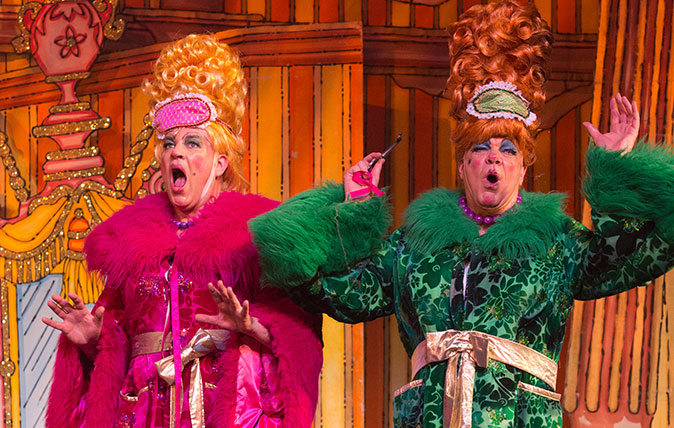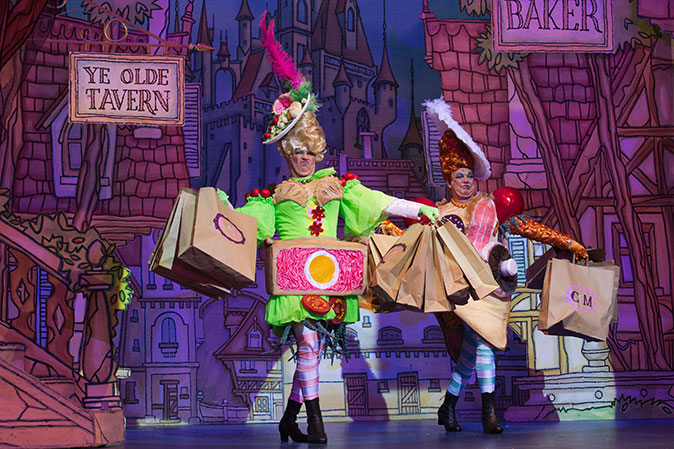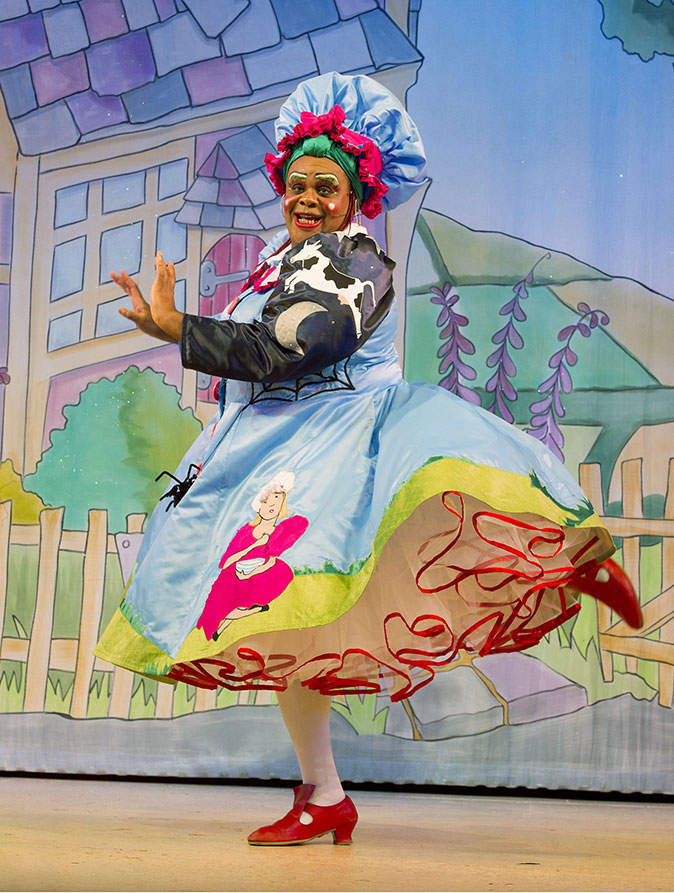Why we still love pantomime ('Oh no we don't'...'Oh yes we do'...)
Corny, hammed-up, ritualistic – and yet Pantomime is still a hugely lovely theatrical format. Perennial pantomime villain Kit Hesketh-Harvey explains why.


It’s as bizarre, as inexplicable to foreigners, as cricket or ‘Mornington Crescent’. It smells of sweets and sweat, of sherry and sulphur. It’s as gaudy, as tasteless, as a tinsel Christmas tree. Part commedia dell’arte, part music hall, its political satire is as subtle as a bazooka, its rabid incorrectness as bawdy as a McGill seaside postcard. It’s also the emergency drip of our regional theatres, without which they couldn’t function financially. And it’s murder to do: I lose 20lb each season.
Pantomime is the safety valve that binds generations – indeed, this island – together. It’s a litmus test and defiant celebration of our Britishness and it sanctions the release of a year’s tension. The servants mock their masters as precisely as they did in the medieval Feast of Fools and, on Twelfth Night, in the midnight ‘cod’ pastiche of the run, the backstage crew mocks even the mockers.
It’s shot through with superstition. One must never utter the final line during rehearsals so as to jinx the opening night with a perfect rehearsal. One leaves the dressing room with one’s best foot forward, stepping out on the left – possibly a Masonic belief. No whistling, no peacock feathers, no flowers on stage and it’s unlucky to rehearse the bows.
The ‘Oh yes you do’ and ‘It’s behind you’ are as ritualistic as the tree or pudding. The proscenium arch, the fourth wall, the suspension of disbelief – all become irrelevant. Corny routines – the chase scene, the custard-pie scene, the ghost gag – are greeted rowdily as long-lost friends, the drunken uncles at the party. The characters are as predictable as The Queen’s Speech or the Boxing Day hangover. The story barely matters.
The lead comic is the link back to commedia dell’arte: Harlequin’s child (the original Harlequinades were improvised around set pieces). He has to be able to control every aspect of the performance, however badly and delightfully it may go off-script. He’s the conduit between stage and audience, a rapport that continues today with asides, ad-libs, knowing looks and endless audience participation.
The most famous comic characters are Buttons, Wishee-Washee, Muddles, Idle Jack, Silly Billy and Simple Simon. Jamie Brook, author-director at the Yvonne Arnaud Theatre in Guildford, has played them all. ‘The slap-stick was a comedy prop/sound effect and, even now, the lead comic has his lines and actions punctuated by the percussion section,’ he explains.
The physical slapstick element also endures. The comic has a prop, left somewhere in the audience’s care, at which they are instructed to call out whenever someone else approaches – it’s simply a device to propel the story.
Exquisite houses, the beauty of Nature, and how to get the most from your life, straight to your inbox.
Buttons is the only character across Pantoland who has a standard costume: blue bellboy suit and pillbox hat, a throwback to the Victorian bellboys who were nicknamed for the buttons on their uniforms. Mr Brook adds: ‘Usually, he has an unrequited love. He does the singalong, when a large sheet with lyrics painted on it is flown in, at which three children are taken onto the stage and interviewed. They’re often the best part of the show.’
The pantomime fairy is another narrative essential. Bonnie Langford is our national doyenne. ‘I’ve flown into scenery, walked onstage with my bra snared on my dress, tangled my hair in Buttons’s buttons and been enveloped by dry ice while trying to sing a soppy ballad,’ she says.
‘Fairy is Mrs Once Upon A Time and Mrs Happy Ever After. She’s the children’s friend, the one who tells them not to be frightened, that this is a wonderful make-believe.
‘She must, must remain magical at all times and always, always keep her wand upright, in case the magic flows out of it, even when her twinkly bosom is being groped by a mesmerised five-year-old.’
A near-forgotten tradition is that the fairy passes her wand to her left hand when the villain’s on stage to protect her heart. Said villain invariably kicks off the show, entering from stage left. The practical reason is that the trap by which the baddie makes his entrance is generally at stage left, but there are superstitious reasons, too. The left is the sinister side: Judas sat on Jesus’s left and we throw spilt salt over our left shoulder ‘into the devil’s face’.

After seven years, and being too-generously dubbed ‘the best villain in the business’ by Gyles Brandreth, I get quite protective about my perennial role. Pantomime will be a child’s first experience of theatre and they must be made aware of its power instantly, that it’s not TV or an Xbox game.
I have, therefore, 45 seconds in which to scare the bejaisus out of them. My pleasing record stands at nine children physically removed, howling. There’s also huge satisfaction in playing on two distinct levels: fairy story for the kids and subtext and innuendo for the grown-ups.
The great dames – Christopher Biggins, Desmond Barrett, Clive Rowe – have their places in theatre history assured. One Boxing Day at Brighton, Mr Biggins was in full flood when he asked a little girl what she’d had for Christmas. ‘Nothing,’ came the response. The audience froze in alarmed sympathy.
‘But you must have had something?’
‘No. We’re Jewish.’

How do you explain to Americans that the principal boy is played by a girl in thigh boots? The height of popularity for women playing the ‘breeches role’ was in the Victorian era when women could get away with showing more of their legs on stage. Although most theatres now cast this role gender-specifically, we stick with tradition.
Julian Clary covers all bases. ‘Dressing up and wearing lots of make-up is what I’d be doing of an evening anyway, so I might as well get paid for it,’ he says.
‘Danny La Rue taught me that if you’ve got the right outfit on, all you have to do is walk on stage with your arms stretched out and you’ll get tumultuous applause.’
The principal boy and girl are last to take their bows. The show is usually named after one of them and it’s traditional that the walk-down takes place after the couple’s wedding, then it’s the stagger-off to the showers.
By Twelfth Night, I’m so exhausted that it’s all I can do to make it to the stage door, but if one must spend Christmas away from home then the close-knit surrogate family, cast, crew, Babes, front-of-house, all working flat out for 12 hours a day in this demented endeavour, comes a pretty close second. Oh yes it jolly well does!
Country Life is unlike any other magazine: the only glossy weekly on the newsstand and the only magazine that has been guest-edited by His Majesty The King not once, but twice. It is a celebration of modern rural life and all its diverse joys and pleasures — that was first published in Queen Victoria's Diamond Jubilee year. Our eclectic mixture of witty and informative content — from the most up-to-date property news and commentary and a coveted glimpse inside some of the UK's best houses and gardens, to gardening, the arts and interior design, written by experts in their field — still cannot be found in print or online, anywhere else.


